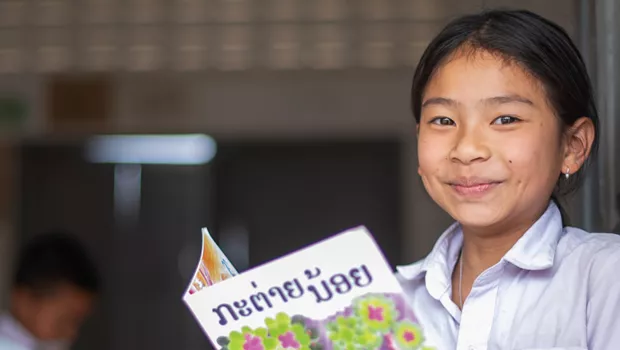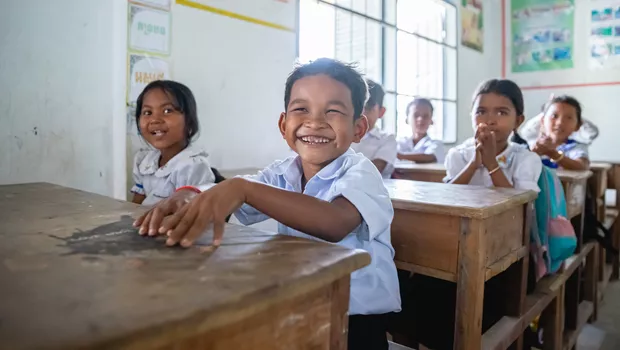Patricia Andrews Fearon is a Content Developer at Room to Read. This post, authored by Patricia, originally appeared in The Huffington Post and in the Skoll World Forum on November 11, 2014.
*****
We recently made a short video with a cheeky challenge: DO NOT READ THIS. The idea was to force people to think about how integral literacy is to their daily lives since it is a skill most of us (reading this sentence right now) take for granted. But is it safe to assume that we have adequately embraced the value of education? And not just for us, but for everyone?
A recent comment on our DO NOT READ THIS video reminded me why we still have work to do when it comes to advocating for education. I couldn’t help but notice how this comment spells out an attitude that I suspect many still hold. Here’s the final, pointed sentence:
“The money spent on teaching starving kids in Africa how to read would be better spent fighting LEGITIMATE issues, like world hunger.”
The message is clear. Literacy, and by extension education, is not a legitimate issue. In fairness to this person, it may feel justified to address something like hunger over literacy. If someone were dying of hunger, they likely would prefer a bowl of rice over a book.
But this “either/or” emergency scenario inadequately represents the real fight against hunger. Those who fight hunger know that, while at times necessary, handing out food is not enough to systemically and forcibly end the problem. Rather, lasting solutions are those that empower individuals and communities to provide for themselves.
When you take seriously the human desire to be self-sustaining and fulfilled, you can see why human needs don’t always fit into a simple hierarchy.
At Room to Read, I hear countless stories of students traveling long and dangerous distances to get to class, students who forgo food to afford school fees, and girls who defy their families and risk social scorn to obtain an education. Perhaps they understand something that we fail to fully appreciate.
As former United Nations Secretary-General and Nobel laureate Kofi Annan stated:
“Literacy is a bridge from misery to hope… It is a bulwark against poverty, and a building block of development… Especially for girls and women, it is an agent of family health and nutrition. For everyone, everywhere, literacy is, along with education in general, a basic human right…. Literacy is, finally, the road to human progress and the means through which every man, woman and child can realize his or her full potential.”
We don’t fight for education because we think it’s more important than fighting climate change, poverty, conflict, hunger, or disease. We fight for education precisely because we care about these things. Here are the facts:
- Health: There would be 49 percent fewer child deaths in low-income countries if all women had secondary education.
- Environment: Across 29 countries, concern for the environment increases with the level of education.
- Conflict: In sub-Saharan Africa, the risk of conflict in countries with higher education equality is almost half that of areas with lower equality in education.
- Poverty: If all students in low-income countries left school with basic reading skills, 171 million people could be lifted out of poverty.
Yet, funding for global education has been shrinking, and now represents only 1.4 percent of humanitarian aid.
We know that education is one of the most powerful tools we can use to further human flourishing, and we also know that if a child fails to achieve basic literacy skills by at least the third grade, it becomes almost impossible for him or her to catch up. Yet, we struggle to treat education with a sense of urgency. Perhaps this is why the BBC recently described the lack of global education as “one of the biggest man-made disasters on the planet,” and raised the question: “Why does a lack of education never get treated like an emergency?”
We’ve been wondering the same thing.
In an interconnected world, we can’t always arrange our problems in a linear fashion to solve one at a time. We must invest in proven, dynamic, and manifold strategies. This is exactly how Room to Read targets two of the most critical steps on the path to global education: literacy and gender equality in education.
We tackle these issues from every angle, and the results are astounding.
Our interventions have benefited nearly nine million children and we intend to impact at least 10 million by the end of 2015. While these numbers are exciting, the quantity wouldn’t mean anything if we did not rigorously research, monitor and evaluate the efficacy of our interventions in order to validate the quality of that impact. With this validation, we can be confident that the solutions we are creating for global education can pave the way towards even more lasting solutions for our world.



